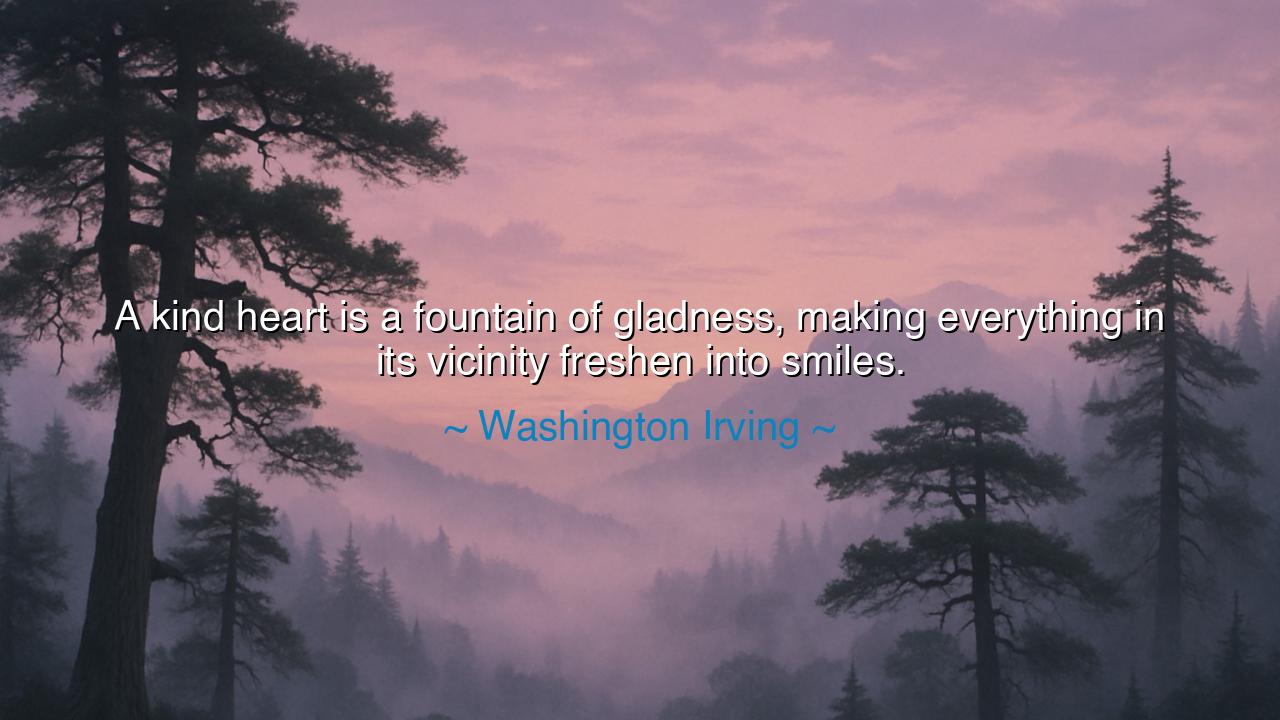
A kind heart is a fountain of gladness, making everything in its
A kind heart is a fountain of gladness, making everything in its vicinity freshen into smiles.






Hear the gentle yet noble wisdom of Washington Irving, who declared: “A kind heart is a fountain of gladness, making everything in its vicinity freshen into smiles.” In these words lies the recognition of a profound truth—that goodness, when genuine, does not remain contained within one soul. It overflows, like a spring whose waters cannot be held back, touching all who draw near. The kind heart is not passive; it is active, life-giving, and transformative. Its very presence becomes a source of renewal to others, refreshing weary spirits and awakening joy.
The ancients would have likened the kind heart to a sacred well in the desert. In barren places, where harshness and cruelty dry the spirit, such a well gives life to all who approach. One does not need to own it, nor pay for it, nor prove worthiness to drink; its waters flow freely. So too does kindness flow. The man or woman who carries within them a kind heart spreads unseen blessings: a word spoken gently, a deed done without expectation, a smile that reminds another they are not alone. This is no small power. It is, indeed, a fountain of gladness.
History offers us shining examples of this truth. Consider the life of Florence Nightingale, who walked among the wounded in the Crimean War. The soldiers called her “the Lady with the Lamp,” not because she bore great riches or titles, but because she bore a kind heart. Her presence, her gentleness, her quiet compassion became a fountain from which the broken drew strength. They said that even her smile, passing from bed to bed, lightened their suffering. This is precisely Irving’s vision—kindness does not heal the body alone, but refreshes the spirit, making everything around it come alive again.
Even in smaller tales this wisdom is seen. A teacher who believes in a struggling child, a neighbor who offers bread to the hungry, a stranger who shares a word of encouragement—these are acts of the kind heart. Each creates ripples beyond what is seen, each smile planted becomes a seed that grows in the soil of another’s life. A world often darkened by greed and ambition is quietly remade by these springs of gladness. They are humble, but they endure longer than monuments of stone.
The meaning of Irving’s words is that kindness is not only a virtue for the one who possesses it, but also a blessing to the community. A kind heart is never wasted. Its effect spreads like fragrance in the air, unseen yet undeniable. Where it dwells, bitterness softens, sorrow eases, and faces brighten with smiles. In this way, the power of kindness is greater than force, for it transforms not by compulsion but by awakening joy.
The lesson for us is clear: cultivate a kind heart, for it will not only preserve your own soul but will also refresh those around you. Do not underestimate the quiet strength of gentleness. Do not believe that your kindness is too small, for fountains begin with hidden springs. Each word of compassion, each selfless deed, each offered smile becomes water for those who thirst.
Practical action flows naturally. Begin with small things: be patient where anger rises, be generous where scarcity tempts you to hoard, be gentle when others are harsh. Let your smile become your gift, your kindness your legacy. Seek daily to refresh at least one soul, to brighten at least one face, and in so doing, you yourself will be renewed.
Thus, let Irving’s words stand as an enduring banner: “A kind heart is a fountain of gladness, making everything in its vicinity freshen into smiles.” For kindness is not a fleeting gesture—it is a wellspring of life, flowing outward into the world, leaving all it touches greener, brighter, and more alive.






AAdministratorAdministrator
Welcome, honored guests. Please leave a comment, we will respond soon